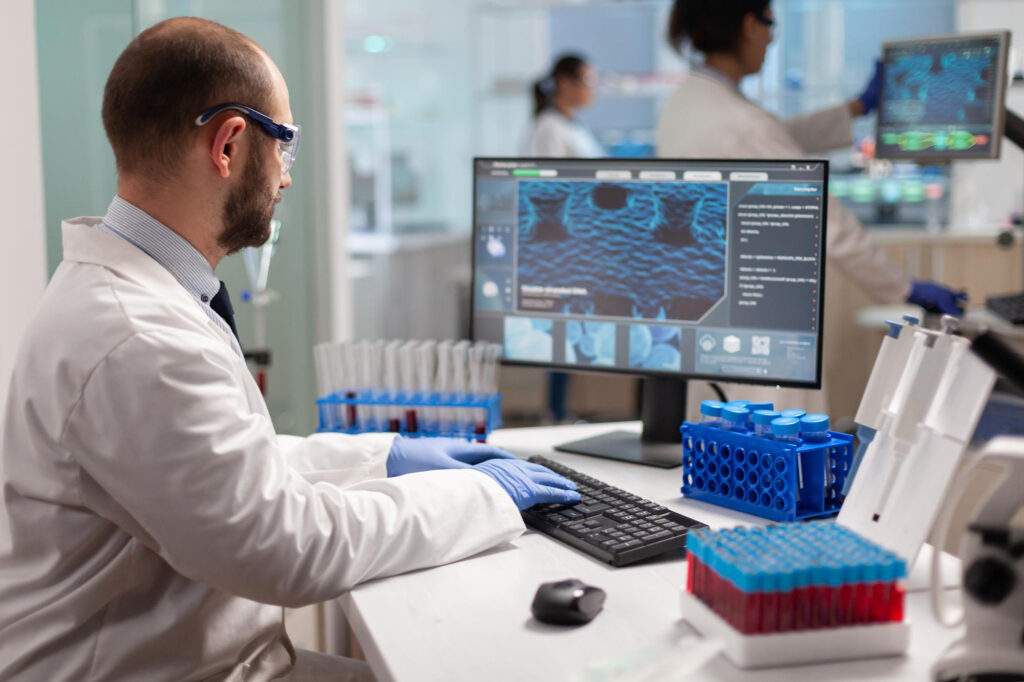Introduce the topic of the key traits necessary for success as an LIS Coordinator
In today’s fast-paced laboratory landscape, effective and precise data management is crucial. A vital element of this system is the Laboratory Information System (LIS) Coordinator. These proficient individuals ensure the efficient functioning of your LIS, the fundamental pillar of your lab’s data infrastructure. So, what sets a superior LIS Coordinator apart from the rest? The distinction lies in a unique combination of skills and competencies. This blog post will explore the essential characteristics that differentiate exceptionally successful LIS Coordinators, enabling you to pinpoint the perfect candidate for your team.
Attention to Detail
Discuss the importance of attention to detail in managing laboratory information systems.
An LIS Coordinator’s success is dependent on their keen attention to details. Laboratory data is extremely valuable, impacting key decisions about medical treatment, research outcomes and product development. Even small errors in data input, sample management or equipment calibration can have a substantial impact. Having a sharp attention to detail maintains the accuracy of your lab’s data, promoting confidence and dependability in your results.
Provide examples of how this trait is crucial in their daily tasks.
The following are some particular instances of how LIS coordinators must pay close attention to detail:
- Data entry: To ensure data integrity, sample information, test parameters and findings must be accurately recorded. Even a missed decimal point or typographical error can result in misinterpretations.
- Sample management: Keeping track of samples throughout the testing process ensures that they are handled correctly and evaluated according to protocol. Erroneous labeling of a sample or a misstep can jeopardize the entire analysis.
- Quality Control: Careful examination of equipment performance data, calibration records and control sample outcomes help ensure the precision and uniformity of laboratory testing. Detecting inconsistencies promptly enables necessary corrections to be made.
- Report Generation: Creating clear and accurate reports reflecting laboratory data requires meticulous attention to detail. Any mistakes or vague information in reports can cause confusion and lead to uninformed decisions.
Strong Analytical Skills
Explain why strong analytical skills are essential for an LIS Coordinator.
Beyond precise record-keeping, an LIS Coordinator depends on strong analytical abilities. The laboratory environment generates a steady stream of data and the ability to understand as well as derive meaningful conclusions is critical. LIS Coordinators play an important role in:
- Troubleshooting Issues: When instruments fail, unexpected results occur or workflows experience bottlenecks, strong analytical abilities enable the LIS Coordinator to identify core causes, resulting in efficient problem-solving.
- Process Optimization: By evaluating laboratory data, LIS Coordinators can find opportunities to increase workflow efficiency, resource allocation and test turnaround times.
- Ensuring Data Integrity: Analyzing trends in control samples and instrument performance data enables LIS Coordinators to proactively spot potential data quality issues and implement corrective actions to prevent inaccuracies that could compromise patient care or research findings.
Discuss how these skills are applied in problem-solving and decision-making.
Let us look at how strong analytical skills translate into practical applications for LIS Coordinators.
- Investigating Discrepancies: If a patient’s test results deviate significantly from expected values, the LIS Coordinator can examine previous data, reference ranges and external factors to identify plausible causes and assure correct diagnoses.
- Identifying Trends: By reviewing laboratory data over time, the LIS Coordinator may detect trends in specific illness occurrences, treatment efficacy or instrument performance, suggesting additional inquiry or protocol changes.
- Optimizing Test Selection: With analytical skills, the LIS Coordinator can evaluate past data and select the most relevant tests for specific patient instances, reducing wasteful testing and optimizing healthcare expenses.
Communication Skills
Highlight the importance of effective communication in coordinating with various stakeholders.
Within the lab, an LIS Coordinator serves as a focal point and interfaces with several stakeholders. Effective communication is essential for promoting teamwork, ensuring lucid comprehension of laboratory procedures, as well as producing precise and punctual outcomes, eventually.
- Liaison Between Departments: The LIS Coordinator serves as a liaison between laboratory workers, doctors and researchers. They must effectively explain complex laboratory data and testing procedures to workers from various technical backgrounds.
- Patient Care: In some cases, the LIS Coordinator may need to deal directly with patients, particularly when explaining test results or addressing concerns. Clear and precise communication is critical for reducing patient anxiety and ensuring informed decisions.
- Vendor Management: Maintaining effective communication with LIS vendors is crucial for swift troubleshooting, software updates and the effective resolution of technical issues. The LIS Coordinator must clearly articulate technical challenges and collaborate with vendors to identify solutions.
Provide examples of scenarios where good communication is critical for success.
Let’s explore specific situations where strong communication skills are crucial for an LIS Coordinator:
- Explaining Test Results to Clinicians: When an unexpected laboratory result occurs, it may be vital to communicate clearly and concisely with a clinician to discuss potential causes, next steps and additional testing as required.
- Training New Staff: It is critical to clearly explain LIS functions, data entry methods and quality control protocols to new laboratory professionals in order to ensure proper data capture and analysis.
- Presenting Data to Researchers: LIS Coordinators may be asked to show researchers laboratory data. Accurate conclusions can be drawn from the data if complex findings are effectively communicated in a clear and straightforward way.
Adaptability
Discuss the need for adaptability in a constantly evolving laboratory environment.
The world of laboratory medicine is dynamic. New technologies, innovative testing methodologies and evolving regulatory landscapes are commonplace. An ideal LIS Coordinator thrives in this environment, demonstrating exceptional adaptability. The ability to embrace change, learn new skills and adjust to unforeseen challenges is crucial for ensuring the LIS remains at the forefront of laboratory operations.
Explain how an LIS Coordinator must be flexible in handling new challenges and technologies.
- New Technology Implementation: As new laboratory instruments and software are introduced, the LIS Coordinator must quickly react by learning new functions, upgrading workflows and teaching personnel on the latest technologies.
- Evolving Regulations: The requirements for laboratory testing are subject to change. An adaptive LIS Coordinator stays up to date on these developments and ensures that the LIS complies with the newest regulations.
- Unexpected Challenges: Technical faults, equipment malfunctions and unplanned disruptions to operations are unavoidable in any laboratory environment. A flexible LIS Coordinator can think quickly, troubleshoot problems effectively and apply temporary solutions to reduce downtime and maintain efficient operations.
Leadership Abilities
Explore the role of leadership in effectively managing LIS operations.
An LIS Coordinator does not work in isolation. They typically supervise a team of laboratory staff responsible for data entry, sample management and quality control tasks. Possessing effective leadership skills is essential for inspiring and motivating their team to achieve optimal performance. Leadership plays a critical role in the success of LIS Coordinators for the following reasons:
- Team Management: The LIS Coordinator sets the tone for the team, encouraging collaboration and productivity. Effective delegation of work, clear instructions and direction guarantee that key laboratory functions are completed efficiently.
- Training and Mentorship: Many LIS Coordinators mentor and train new team members. Strong leadership abilities enable them to foster a positive learning environment in which new employees may build the skills and knowledge required to flourish in their professions.
- Project Management: Implementing new LIS features, streamlining workflows and addressing complicated technical issues frequently necessitate a project-management strategy. Leadership qualities enable the LIS Coordinator to successfully distribute work, monitor progress and assure project completion on schedule.
Discuss how an LIS Coordinator leads teams and drives initiatives.
Let’s look at a few specific ways on how LIS Coordinators exhibit their leadership abilities:
- Establishing Clear Goals and Expectations: A successful leader makes sure that everyone on the team is in agreement with priorities as well as objectives by communicating clear goals and expectations to them.
- Encouraging Collaboration: A key component of good leadership is creating an atmosphere where team members are at ease exchanging ideas and working together to solve problems.
- Motivating and Inspiring Employees: Offering opportunities for professional growth, giving constructive criticism along with recognizing accomplishments all help to keep employees inspired and motivated at work.
- Promoting Continuous Improvement: A proactive LIS Coordinator sets the standard for innovation by taking the lead on projects to streamline processes, boost productivity and keep up with the quickly changing laboratory environment.
Conclusion
Prioritizing these crucial competencies—strong analytical talents, adaptability, leadership and attention to detail—can help you choose a LIS Coordinator who will be a vital component of your lab’s success. Their attention to detail will help ensure data integrity; their analytical abilities will propel problem-solving and optimization; and their leadership as well as communication abilities will cultivate a productive and cooperative team atmosphere. Investing in the right LIS Coordinator gives your laboratory the ability to produce quick and reliable results, which improves patient care, advances research and gives you a competitive edge in the constantly evolving healthcare industry.
Staffing Made Effortless. Let the Experts Handle Your Hiring
Helping companies discover the perfect talent for their needs. Finding the right individuals to drive your success is what we excel at.





